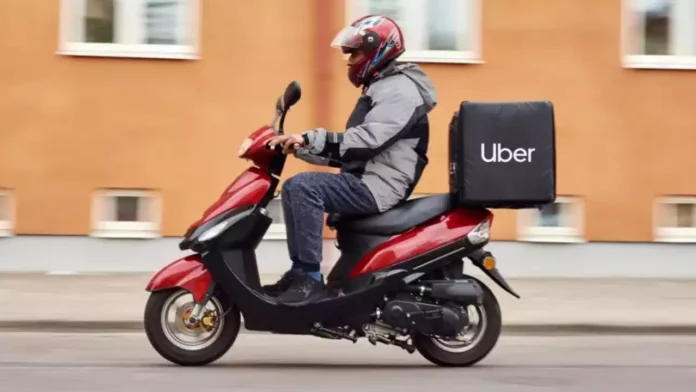As the demand for quick commerce grows in India, ride-hailing platform Uber is intensifying its hyperlocal deliveries from neighborhood stores, according to sources familiar with the matter.
This service has been introduced by the company in nine Indian cities utilizing two-wheelers, with customer orders being collected from nearby stores.
At present, Uber solely facilitates the delivery of items, with customers required to directly pay the store. However, moving forward, it aims to streamline the process by also handling payments from customers on behalf of the stores, according to one of the sources.
Uber India’s introduction of its store pickup service, mirroring its existing service in the US, coincides with the decline of Reliance-backed Dunzo, which offered similar services. Last month, Walmart-backed PhonePe withdrew from delivering non-food categories it had offered via the ONDC network, while Ola restarted some of these services.
Continue Exploring: Quick commerce sector soars as Millennial and Gen Z homes drive growth
This signals the entry of a global technology company into India’s rapidly growing quick-delivery sector, which has predominantly been dominated by Blinkit, and Instamart.
Flipkart, the ecommerce marketplace, is also strategizing to step into the quick-commerce arena. Meanwhile, companies like Ola, Rapido, and Porter provide on-demand pickup and drop services.
Uber is launching its service by delivering prepaid items from local shops, department stores, pharmacies, and other locations. However, the scope will expand, with Uber collecting and making payments on customers’ behalf straight to the shops,” the source explained.
Continue Exploring: BigBasket and Flipkart accelerate delivery services to compete with quick-commerce rivals
A senior executive from a Gurugram-based company specializing in delivery and logistics remarked, “Quick-commerce platforms have significantly influenced consumer purchasing patterns. In urban areas, the demand for such services continues to grow, indicating ample opportunities for new players to enter the market.”
“Various companies are anticipated to adopt diverse strategies… Some might opt for the investment-intensive dark store model, while others may focus on enhancing the delivery infrastructure. Uber, for instance, is utilizing its current fleet of two-wheelers from its bike-taxi service,” explained the executive.
Reports indicate that around 12 million local kirana stores witnessed a notable slowdown in sales during the final quarter of 2023, even as quick-commerce firms gained market share, catering not only to impulse purchases but also to bulk orders of staples.
Continue Exploring: Quick-commerce giants grab 30-50% of FMCG sales, kirana stores witness slowdown
In response to inquiries, a representative from Uber confirmed the news, stating that the company has officially launched its store pickup service in Delhi-National Capital Region, Bengaluru, Chennai, Hyderabad, Jaipur, Lucknow, Kolkata, Guwahati, and Ludhiana.
“Our store pickups service is a recent addition to our offerings, allowing users to request an Uber driver to collect prepaid items from a designated store. Customers will have the flexibility to choose any store within the serviced areas, provided they share its location, and complete the payment directly,” the spokesperson explained.
The India division of the San Francisco-based company, primarily known for its ride-hailing services, has recently been increasing its investments in the delivery sector.
One of the sources mentioned above stated, “The company makes data-driven decisions, ensuring that any project or experiment is pursued only if it demonstrates ongoing financial viability.”
In 2020, the company divested its food delivery venture, UberEats, to Zomato through an all-stock transaction.
On a global scale, Uber is broadening its grocery delivery operations conducted through UberEats.
According to industry sources, up until the start of 2023, Dunzo held the top position in peer-to-peer package delivery services. However, following its decline, its competitors have seized the opportunity to gain momentum.
Continue Exploring: Quick commerce platforms Blinkit and Zepto expand into e-commerce, targeting fashion, beauty, electronics, and more
In January 2023, Porter, introduced two-wheeler delivery services catering to both individuals and businesses. Subsequently, in October, Ola, Uber’s primary competitor, along with Zomato, also launched their hyperlocal delivery services.
“Following Dunzo’s decline in the market, Porter and Uber have predominantly filled the void in the package delivery sector,” noted an industry executive. “Additionally, Swiggy Genie has experienced substantial growth during this period.”
In 2022, Ola ceased its quick-commerce operations amid cuts to ancillary segments. Last year, it introduced food delivery on its ride-hailing app via the government-backed ONDC network, having previously suspended its own food delivery service.
Continue Exploring: D2C brands shell out 30-45% commission for quick-commerce platform listings





